
HUSSERL STUDIES
Scope & Guideline
Advancing Understanding of Husserl's Legacy
Introduction
Aims and Scopes
- Phenomenology and Consciousness:
The journal explores the nature of consciousness as understood through phenomenological methods, emphasizing intentionality, self-awareness, and the structures of experience. - Ethics and Normativity:
A significant focus is placed on ethical implications derived from phenomenological insights, particularly how Husserl's work informs contemporary discussions on moral philosophy and normativity. - Interdisciplinary Approaches:
Husserl Studies encourages interdisciplinary research that connects phenomenology with fields such as cognitive science, psychology, and the natural sciences, exploring how phenomenological insights can inform these areas. - Historical Contextualization:
The journal frequently examines Husserl's work in relation to other philosophical traditions and figures, including Hegel and contemporary analytic philosophy, to contextualize and critique phenomenological approaches. - Aesthetic and Existential Dimensions:
Research often delves into the aesthetic dimensions of Husserl's thought, including the role of emotion, art, and beauty in human experience, as well as existential themes related to human existence and subjectivity.
Trending and Emerging
- Embodiment and Affective Experience:
There is a growing interest in the role of embodiment and affective experiences within phenomenology, emphasizing how physical presence and emotions shape consciousness and interpersonal relations. - Normativity and Values:
Research increasingly addresses the concepts of normativity and values from a phenomenological perspective, exploring how Husserlian thought can contribute to contemporary ethical discussions and frameworks. - Cognitive Science Integration:
The integration of phenomenology with cognitive science is on the rise, reflecting an interest in understanding consciousness and perception through empirical and interdisciplinary lenses. - Phenomenology of Emotion:
The exploration of emotions as fundamental to human experience is gaining traction, with studies focusing on the phenomenological significance of feelings and their implications for understanding human agency and interaction. - Existential Phenomenology:
There is an increasing emphasis on existential themes within phenomenology, particularly regarding the nature of existence, identity, and the human condition, reflecting broader philosophical trends.
Declining or Waning
- Psychologism:
Discussions surrounding psychologism, which critiques the conflation of psychological and philosophical analysis, have seen less emphasis. This may indicate a shift towards more normative and existential considerations in phenomenology. - Formal Logic and Mathematical Applications:
The application of formal logic and mathematical frameworks in phenomenological discussions has become less prevalent, suggesting a move away from strictly analytical approaches towards more qualitative and interpretative analyses. - Historical Figures and Contexts:
While historical contextualization remains important, the frequency of papers focusing solely on historical figures outside of Husserl, such as Lotze or Kant, has decreased, indicating a potential narrowing of focus to primarily Husserlian themes.
Similar Journals
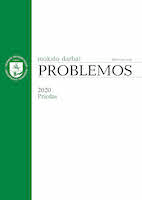
Problemos
Pioneering New Frontiers in Philosophical ThoughtProblemos is an esteemed academic journal published by VILNIUS UNIV PRESS, dedicated to advancing research in the field of Philosophy. With an ISSN of 1392-1126 and E-ISSN 2424-6158, this open-access journal has been disseminating knowledge and fostering scholarly dialogue since 2005. Situated in Lithuania, Problemos has gained recognition, achieving a prestigious Q2 category ranking in the 2023 Philosophy category and a Scopus rank of #458 out of 806, placing it in the 43rd percentile. The journal covers a broad spectrum of philosophical inquiries, making it an essential resource for researchers, professionals, and students seeking to engage with contemporary philosophical discourse. By offering unrestricted access to its content, Problemos promotes the free exchange of ideas and encourages collaboration across disciplines, establishing itself as a pivotal platform within the academic community.
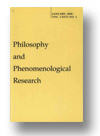
PHILOSOPHY AND PHENOMENOLOGICAL RESEARCH
Exploring the Depths of Thought and ExperiencePHILOSOPHY AND PHENOMENOLOGICAL RESEARCH, published by Wiley, stands as a premier journal within the realms of Philosophy and the History and Philosophy of Science, boasting an impressive Q1 ranking in both categories as of 2023. With the ISSN 0031-8205 and E-ISSN 1933-1592, this esteemed journal has been a pivotal platform for philosophical inquiry since its inception in 1970. Dedicated to advancing understanding in phenomenology and its implications across various disciplines, the journal encourages scholarly discourse through high-quality peer-reviewed articles that explore both classical and contemporary philosophical thought. With a Scopus ranking of #46 in Philosophy and #20 in the History and Philosophy of Science, PHILOSOPHY AND PHENOMENOLOGICAL RESEARCH operates at the confluence of rigorous academic investigation and innovative ideas, making it an indispensable resource for researchers, professionals, and students alike. As part of its commitment to facilitating scholarly communication, the journal does not currently offer open access but ensures accessibility through various institutional subscriptions. Discover the rich tapestry of philosophical inquiry that shapes our understanding of the world in its pages.

Kalagatos-Revista de Filosofia
Empowering Research and Reflection in the Philosophical RealmKalagatos-Revista de Filosofia is a distinguished academic journal published by UNIV ESTADUAL CEARA-UECE, focusing on a broad spectrum of philosophical inquiries and scholarly discussions. With an ISSN of 1808-107X and an E-ISSN of 1984-9206, this Open Access journal has been dedicated to disseminating high-quality research and fostering critical thought in the field of philosophy since its inception in 2004. Positioned as a vital resource for researchers, professionals, and students alike, Kalagatos encourages dialogues that traverse traditional boundaries in philosophical discourse. With its commitment to accessibility and quality, the journal plays a pivotal role in contributing to the philosophical landscape, making knowledge available to a global audience. The journal seeks to publish original research articles, reviews, and essays that address contemporary and historical philosophical challenges, nurturing a vibrant academic community engaged in meaningful exploration and reflection.

Bollettino Filosofico
Engaging Scholars in the Pursuit of Philosophical KnowledgeBollettino Filosofico, published by the CAB-Center Libraries Federico II University of Naples, stands as a noteworthy contributor to the field of philosophy. With an ISSN of 1593-7178 and an E-ISSN of 2035-2670, this journal delves into diverse philosophical inquiries, engaging both contemporary and historical debates within the discipline. Though it currently holds a Q4 ranking in the Philosophy category, the journal aims to foster dialogue and scholarship among its readers. Operating from its esteemed location in Napoli, Italy, the journal seeks to enhance the visibility of philosophical research and provide a platform for emerging ideas and scholars. While it is not open access, it promotes the dissemination of significant philosophical concepts, aiming to engage an academic audience passionate about the intricacies of philosophical thought. For researchers, professionals, and students alike, Bollettino Filosofico presents an invaluable resource for exploring the evolving landscapes of philosophical discourse.
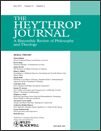
HEYTHROP JOURNAL
Fostering Interdisciplinary Insights Since 1960Heythrop Journal, published by Wiley, is a distinguished academic periodical that serves as a critical forum for interdisciplinary dialogue spanning multiple fields including philosophy, religious studies, and the sciences. With an impact factor that reflects its growing influence, the journal has successfully engaged scholars since its inception in 1960. The journal is categorized under several quartiles in 2023, notably achieving Q3 rankings in Philosophy and Religious Studies, emphasizing its role in advancing scholarly discourse. The scope of the Heythrop Journal encompasses thoughtful analysis, theological reflection, and interdisciplinary research, appealing not only to researchers and professionals but also to students eager to explore the complex intersections of faith, reason, and contemporary issues. While the journal currently does not offer open access, it continues to maintain a reputation for rigor and relevance within its diverse fields of inquiry. Whether you’re in the realm of neurology or examining waste management sciences, the Heythrop Journal remains a pivotal resource, fostering an enriching environment for intellectual exchange and exploration.
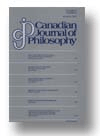
CANADIAN JOURNAL OF PHILOSOPHY
Exploring the Depths of Contemporary PhilosophyCanadian Journal of Philosophy, published by Cambridge University Press, stands as a pinnacle of scholarly discourse in the field of philosophy. With its ISSN 0045-5091 and E-ISSN 1911-0820, this esteemed journal has cemented its reputation since its inception in 1971, continuing to engage with contemporary philosophical issues up to 2024. The journal is highly regarded, currently holding a Q1 rank in Philosophy and positioned in the 89th percentile of its category according to Scopus rankings. Its focus is on advancing philosophical inquiry, offering a platform for both established scholars and emerging voices to share significant research, critique, and innovative ideas. While the journal is not open access, it provides essential insights that are invaluable for researchers, professionals, and students alike, fostering an environment of intellectual exchange and growth in the philosophical community.

FILOSOFICKY CASOPIS
Advancing Interdisciplinary Dialogue in Philosophy and ReligionFilosoficky Casopis is a distinguished open-access journal dedicated to exploring the multifaceted dimensions of philosophy and religious studies. Published by the Institute of Philosophy in the Czech Republic, this journal aims to foster interdisciplinary dialogue and contribute to the evolving debates within these fields. With an ISSN of 0015-1831 and a publication history that spans converged years from 2002 to 2024, Filosoficky Casopis offers valuable insights into contemporary philosophical discourse. Despite its current standing in the Q4 quartile in the 2023 rankings for Religious Studies, the journal remains committed to elevating discussions and providing a platform for emerging scholarship. Since adopting an open-access model in 2021, it has expanded its reach and accessibility, ensuring that its content is readily available to researchers, professionals, and students alike. The journal's address is located at Jilska 1, Prague 110 00, Czech Republic, and it stands as a noteworthy publication for those interested in advancing their understanding of philosophical inquiry and its intersection with religious thought.
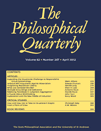
PHILOSOPHICAL QUARTERLY
Elevating Scholarly Conversations in PhilosophyPHILOSOPHICAL QUARTERLY, a leading journal in the field of philosophy, is published by Oxford University Press, recognized for its commitment to advancing scholarly discourse since its inception in 1950. With an ISSN of 0031-8094 and an E-ISSN of 1467-9213, this prestigious journal is situated in the United Kingdom, reflecting a rich tradition of philosophical inquiry. The 2023 Category Quartiles rank it in the Q1 tier, demonstrating its substantial impact within the philosophy domain, supported by a Scopus rank of 130/806, placing it in the 83rd percentile of arts and humanities. While it does not currently offer open access, the journal remains a vital resource for researchers, professionals, and students seeking to engage with contemporary philosophical issues and theories. As it continues to publish insightful articles and critical discussions, the PHILOSOPHICAL QUARTERLY stands as a testament to the ongoing evolution and relevance of philosophical scholarship.
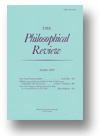
PHILOSOPHICAL REVIEW
Advancing Philosophical DiscoursePHILOSOPHICAL REVIEW, published by DUKE UNIVERSITY PRESS, is a leading academic journal in the field of philosophy, recognized for its rigorous scholarship and impactful contributions to theoretical and applied philosophy. With an impressive Q1 ranking in the 2023 Scopus metrics, it places within the top percentile of philosophical journals, affirming its significance in the discourse. The journal, which has a rich publication history since its inception in 1970, focuses on a diverse range of philosophical topics, catering to a broad audience of researchers, practitioners, and scholars. Although it doesn't offer Open Access options, its articles remain highly sought after for their depth and quality. With a dedicated readership and a commitment to exploring fundamental philosophical questions, PHILOSOPHICAL REVIEW continues to shape contemporary philosophical thought and engage with pressing issues in various domains.
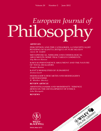
EUROPEAN JOURNAL OF PHILOSOPHY
Exploring the depths of thought across Europe and beyond.European Journal of Philosophy, published by Wiley, stands as a premier academic journal in the field of philosophy, recognized for its rigorous scholarship and impactful contributions. With an impressive Q1 ranking in Philosophy as noted in the 2023 category quartiles, the journal places within the top echelons of its field, reflecting its commitment to advancing philosophical discourse. Covering a broad spectrum of philosophical topics, the European Journal of Philosophy features peer-reviewed articles that engage both contemporary discussions and foundational theories, making it an invaluable resource for researchers, professionals, and students alike. The journal's accessibility to readers in the United Kingdom and beyond ensures a wide dissemination of knowledge, fostering an international dialogue that enriches philosophical inquiry. With a convergence of intellectual contributions since 1993, the journal continues to push the boundaries of philosophical thought into 2024 and beyond.